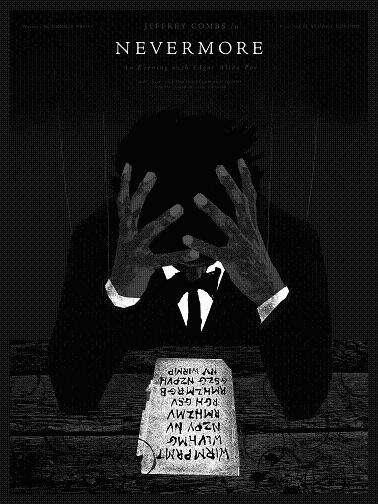 Technically, Fantastic Fest ended on Thursday: But the final curtain did not fall until Saturday and the last Austin performance of Nevermore, horror icon Jeffrey Combs‘ one-man stage show about the life of Edgar Allan Poe.
Technically, Fantastic Fest ended on Thursday: But the final curtain did not fall until Saturday and the last Austin performance of Nevermore, horror icon Jeffrey Combs‘ one-man stage show about the life of Edgar Allan Poe.
Set in 1848, it presents a pivotal moment in Poe’s life: A year after the death of his wife and muse Virgina, the West Point graduate-turned-poet and author was engaged to essayist Sarah Helen Whitman and seemingly turning a corner in his career and personal life. But what looms over the performance is the dark knowledge for the audience that Poe himself will be dead within two years.
It’s a minimalist production, opening with the lighting of a candle and ending with its snuffing out. Much like Hal Holbrook did with Mark Twain or Simon Callow did on the English stage for Charles Dickens, Combs recreates the kind of public recitation allowed nineteenth century authors to make a living. Like Holbrook and Callow, it’s up to Combs to fill the stage solo, which he does from the first moment.
The physical similarity is shocking: Combs, normally known for his angular, vulpine looks, is immediately recognizable as the moon-faced Poe. He lets his face droop into the lethargic, booze-fueled but brilliant visage that stares out of every portrait of the author. Then there’s the voice: In the opening minutes, it’s a bombastic flurry, as the ever-florid and over-dramatic Poe orates to the audience. It’s a breathless introduction to a powerhouse performance, as the barriers between Poe’s sense of the dramatic and his own overbearing tragedy come crashing down like the House of Usher into the deep and dank tarn.
The project brings Combs back together with two long-time collaborators. Director Stuart Gordon cut his teeth on radical theatre back in 1960’s Chicago with Screw Theater before a run as founding artistic director with the Organic Theater Company (including overseeing the first production of David Mamet’s Sexual Perversity in Chicago.) Veteran horror film writer Dennis Paoli has worked with Gordon on seven films, including his four H.P. Lovecraft adaptations: The Re-Animator, From Beyond, Dagon and the Masters of Horror episode Tales From the Witch House.
Combs starred in their first two shared projects (From Beyond and Re-Animator) but it’s the most recent collaboration – the Deconstructonist take on Poe’s The Black Cat – that inspired this live production. Paoli’s text draws from Poe’s own words, mixing classic texts like The Tell-Tale Heart and The Raven (natch) with extracts from letters, missives and essays. Yet it’s Combs that breathes life into those words, and it’s there that he that finds all the contradictions in Poe: A jobbing writer with aspirations to greatness and innovation: A hard-minded editor who thought himself surpassed by lesser writers with better social connections; A bon vivant with a melancholic streak, a lover of the written word caught up in petty literary feuds, and a hopeless romantic torn down by his own pessimism.
The play spent months in Los Angeles before undertaking this current tour, and yet there’s a real feeling that Combs is still bringing something fresh to each audience. Soused and dissolute by the performance’s end, his Poe staggered through the Drafthouse auditorium, bouncing off the space and interacting with audience members as Poe would. What testifies to his power and his performance is that, in those moments, it truly felt like the modern spotlights were gone and had been replaced with the kind of gas-powered limelights that would have lit Poe’s flight in the darkness.